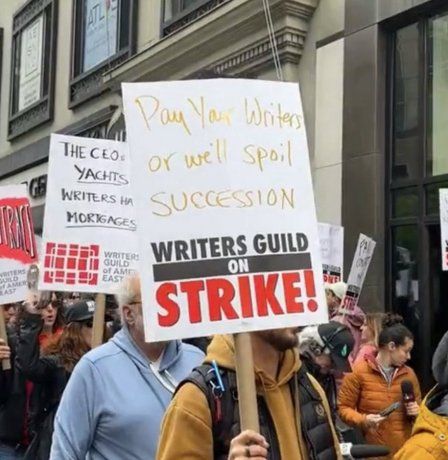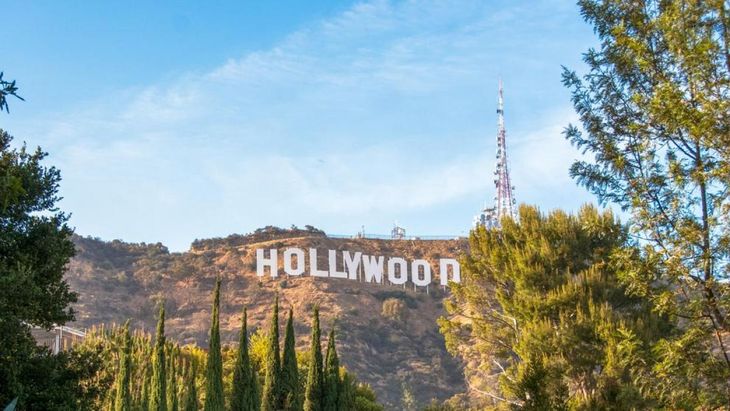In Hollywood, residuals are called financial compensations that a worker obtains from new profits generated by a project on which he worked. We are talking about reruns, broadcasts on TV and the two paradigmatic cases: selling dvds in 2007 and streaming currently.
That strike and its consequences had a huge impact on industry news. On the one hand, the production process of the movies and series was determined in such a way that consumers undoubtedly felt the effects. Without hyphens, the weekly programs written day by day air and cable channel seriesand the films that they had to have scripts ready to start shooting or that they were filming and did not have writers were severely affected. Heroes, LOST and James Bond: Quantum of Solace These were just some of the products that were substantially modified by the strike.
By February 2008, 92% of the union voted to return to work after winning a major victory over their tie to products for “new media” (internet downloads, streaming, smartphone programming, direct-to-internet content and other on-demand and online distribution methods), years before technology changed Hollywood forever. This achievement forced, years later, companies such as Netflix and Amazon were forced to hire writers under the rules of the WGA and with the values established at that time, which now it is required that they be discussed again.
Why is there a strike now and what is the WGA asking for?
hollywood.jpeg
The vanguard
The writers union discusses every three years a new agreement with PTAMP, a chamber that brings together the major Hollywood studios and companies (Netflix, Paramount, Warner Bros. Discovery, Fox, Disney, Comcast/NBCUniversal, Apple and Amazon, among others). After the pandemic and in full business model crisis of streaming, the WGA considered that the situation of the scriptwriters became precarious to already unsustainable levels.
“The survival of writing as a profession is at stake”the WGA said in a statement detailing: “Hand in hand with the industry’s turn to streaming, we screenwriters find our work devalued in all its instances. While company profits remain high and content spending has grown, we writers have lagged behind.”
Within this framework, the union assured that “companies used the transition to streaming to cut the salary of screenwriters and separate the writing process from production, worsening working conditions at all levels” and they stated: “The AMPTP wants to create a freelance work economy where before you could have a full-time career.”
During the month and a half of negotiations, there were a series of demands that were not agreed and that triggered the conflict:
Establish a minimum number of members in the writers rooms
The WGA requested that the writers rooms in pre-productionwhere series are written long before a production begins, have a minimum of six to 12 writers, depending on the number of episodes to write. It also includes regulations for hiring scriptwriters who work on rewrites during filming. This was denied by studiestaking as a counter example the case of the series HBO’s The White Lotus that was only written by its creator and director Mike White.
Minimum weeks of employment per season
One of the great points of conflict is given around the time that scriptwriters spend on set, something that they consider crucial to form the work experience and that has decreased dramatically after the implementation of the pre-production script rooms. The union proposed that scriptwriters should be hired a minimum of three weeks per episode (and a maximum of 52), with the half of screenwriters still employed during filming and at least one during post production.
In a dispute that the writers called “preserve the writers rooms” and the studies baptized “mandatory occupation”the latter rejected the proposal arguing that it can take months Between the time a script is finished, it is approved, shooting begins, and production is completed.
Change the streaming residual formula
The writers union asked that the minimum residual that its members receive from the profits of a streaming production be increased over the next three years by a 6%, 5% and 5%. According to them, the AMPTP offered an increase 2% basis with an increase the next three years of 4%, 3% and 2%.
In addition, the WGA requested that a factor of the formula to calculate the residuals include subscribers outside the US and an award for the success of the products. This was in the face of a difficult Hollywood reality to change: the owners of streaming platforms such as Netflix, Apple or Amazon they follow the Silicon Valley rules of not providing information and therefore there are no official data on the number of people who watch a certain series or movie.
Regulation against artificial intelligence
With the artificial intelligence boom in recent months and its possibilities to affect creative work (something that is under discussion even among experts), the WGA proposed that artificial intelligence “cannot write or rewrite literary material” and may not “be used as source material.” The study association only agreed to study the subject with the possibility of introducing annual meetings “to discuss progress of technology”.
Which series and movies will be affected
writers strike succession (girl)

networks
The impact of the strike is measured in three different sections: the productions for the channels that we call “of air”; the productions for wire and those of streaming. The first ones are the most affected and they see consequences instantly. This was demonstrated by the announcement that the most popular late night shows went on hiatus Indefinitely.
Programs like Jimmy Fallon, John Oliver or Stephen Colbert they work with writers until the last minute before going on the air and therefore will not be able to continue. On social media, many ironically recalled when Conan O’Brien (Late Night host and writer) spent his show seeing how long he could spin his wedding ring to emphasize what a talk show without writers is like.
The next link, cable shows (such as NCIS, Grey’s Anatomy or even The Simpsons), their programming for the coming months is guaranteed, but the season to start between September and October this year will be affected. Normally, the writing for the series that premieres in what they call “the autumn season” (our spring), begins between May and June, so that season could be delayed or even shortened (go out with fewer episodes).
The movies They are one of the most difficult cases to determine. Experience indicates that productions that have to start filming and do not have a finished script or that they will not be able to rewrite during filming they would be seriously affected (the example of James Bond or X-Men Origins: Wolverine resonates from the past strike). Even so, the specialized media point out that if the strike extends, it is most likely that there will be delays and, consequently, fewer releases from the second half of 2024.
Definitelystreaming is the great enemy for screenwriters Because not only did the parameters established in the previous strike change, but a measure of force is not the same then as it is now. According to the latest Nielsen report, now the streaming represents 34% of the use of televisionswhile channels dropped to 24%.
Also, the Production system that the WGA wants to change (where the content is written long before it is approved and filmed) at the same time allows, as he said Ted Sarandos CEO of Netflix, have “a large base of series and movies from around the world that could sustain us for a long time.” This makes it clear that the strike should last many months to be able to affect the production machine on which the streaming industry is based.
One of the examples that resonated the most on the first day of the force measure was the confirmation that the second season of House of the Dragon, the spin-off of Game of Thrones, it will not be affected. The series began filming a few weeks ago with all the scripts finished. It was not reported how they will in the event that some scenes or chapters must be rewritten.
When and how the writers’ strike could end
https://twitter.com/THR/status/1653469787387998208
The reality is that until now the WGA and the AMPTP They did not set a date to resume negotiations and it is difficult to know what the twists of this plot will be. In past experiences, the longest strike was 153 days in 1988. Given a scenario so different from that of 2007how much the scriptwriters can resist and negotiate it is in their hands and in what the studies consider “fair”.
The Writers Guild tackle this measure of force with overwhelming support and its members (some with a lot of recognition in Hollywood) making their claims known in the streets and on social networks. At the same time, the preparation and strength of the studies to support streaming releases they do not make it easy to sustain a lasting strike.
In these first moments, the center of the matter seems to focus on the refusal of the AMPTP to discuss on the number of employees in the scriptwriters’ rooms and the minimum number of weeks of employment. The studios’ attempt to set up live shows to have scriptwriters hired “by the day” also went down badly with the writers. A victory in any of these fields could accelerate the return to jobs.
At the same time, now it’s up to the unions of directors and actors to give their discussions under this framework established by the scriptwriters. The agreements of these unions they expire on June 30 and for them to join the strike would create unimaginable chaos in Hollywood, stopping 100% production of all content.
Source: Ambito
I am an author and journalist who has worked in the entertainment industry for over a decade. I currently work as a news editor at a major news website, and my focus is on covering the latest trends in entertainment. I also write occasional pieces for other outlets, and have authored two books about the entertainment industry.




